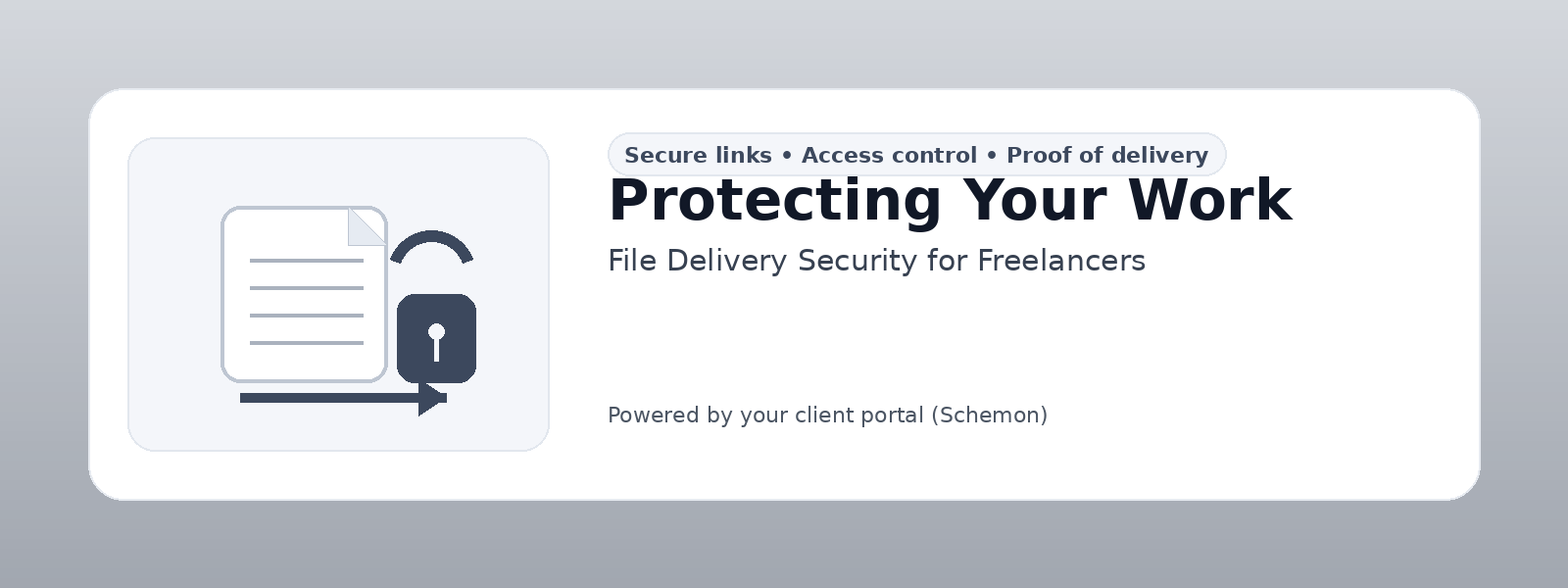Explaining the Importance of Non-Disclosure Agreements (NDAs) in Freelancing
Why Every Freelancer Should Understand, Use, and Respect Confidentiality Agreements



📌 Trust Is the Currency of Modern Freelancing
As a freelancer or small business owner, you deal with sensitive client information all the time:
- Marketing strategies before a product launch
- Business plans not yet made public
- Design files and proprietary code
- User data, analytics, or financial records
- Unique internal processes or software IP
And while trust is essential, trust alone isn’t enough. Enter the Non-Disclosure Agreement (NDA)—a simple but powerful legal tool that protects both your client and you.
In this guide, we’ll walk through:
- What an NDA is and when it applies
- Why clients often require it
- How NDAs also protect your own work
- What key clauses to look for
- And how Schemon helps you send, receive, timestamp, and sign NDAs with ease—right inside the platform you already use to work with clients
🧠 What Is a Non-Disclosure Agreement?
An NDA (Non-Disclosure Agreement) is a legally binding contract that prevents one or more parties from disclosing confidential information shared during a professional relationship. In freelancing, NDAs are commonly used:
- Before hiring to allow full discussion of the project
- During the project to protect ongoing collaboration
- After the project to prevent leaks of sensitive data
💬 Simply put: If someone shares something sensitive with you, the NDA ensures you can’t reveal or reuse it without their permission—and vice versa.
🧰 Types of NDAs Freelancers Might See
1. Unilateral NDA
One party (usually the freelancer) agrees not to disclose the other party’s confidential information.
2. Mutual NDA
Both parties agree to keep each other’s information private. Useful for partnerships or joint ventures where you also share proprietary processes or designs.
3. Project-Specific NDA
Focused on a single collaboration or campaign, often with a clear expiration date.
🎯 Why NDAs Matter for Freelancers
1. Shows You’re Professional
When a client asks for an NDA, they’re usually not being overly formal—they’re protecting their business. Your willingness to sign one shows:
- You’re trustworthy
- You understand the stakes
- You’ve worked at a professional level before
2. Protects Your Reputation
A misunderstanding about confidentiality can ruin relationships—or your credibility. An NDA gives you clear guidelines: what you can say, show, or reuse—and what you can’t.
3. Defines Confidentiality (Legally)
“Confidential” means different things to different people. NDAs clearly outline:
- What information is considered confidential
- Who can access it
- How long the agreement lasts
- What happens in case of breach
4. Creates Boundaries with Clarity
Many freelancers struggle with scope creep. NDAs often pair with contracts that define:
- Ownership of deliverables
- What stays with the client
- What you retain rights to
This helps protect your own intellectual property too.
🧩 Key Clauses to Look For in an NDA
- Definition of Confidential Information: What data, files, or knowledge counts as private.
- Obligations of the Receiving Party: What you must do to protect the information.
- Exclusions: Info that’s not protected (e.g., publicly available data).
- Duration: How long the agreement lasts (often 1–5 years, sometimes indefinite).
- Consequences of Breach: What happens if the NDA is violated.
⚠️ NDA Red Flags to Watch Out For
- No expiration date at all (unless absolutely necessary)
- Unclear definitions of confidential material
- Clauses that restrict you from working in an entire industry
- One-sided obligations without fairness or mutual protection
💬 When in doubt, seek legal advice—or at least run the agreement by a professional contract reviewer.
📄 How Schemon Makes NDA Signing and Enforcement Easy
Traditionally, handling NDAs meant:
- Back-and-forth emails
- PDF downloads
- External e-signature apps
- No real audit trail of when files were sent or signed
Schemon streamlines this entire process—giving you the tools to handle NDAs with the same professionalism as an agency or legal team.
🔐 Features You’ll Love:
Timestamped File Transfers
Every file you send or receive is automatically timestamped. You have a verifiable record of:
- What was shared
- When it was shared
- With whom
This is essential for proving you respected the NDA—or showing that the client received their deliverables on time.
Integrated Digital Signing
No third-party signature platforms needed. You can:
- Upload your NDA
- Send it to the client
- Have both parties sign digitally and securely inside your Schemon workspace
- Store a signed copy alongside the project thread
Clients see you as more trustworthy—and your admin work gets cut in half.
Professional First Impressions
Instead of sending NDAs through messy emails or chat threads, you can invite clients into your branded, secure Schemon portal where everything is streamlined.
From pitch → to NDA → to files → to payments.
All in one place.
✍️ Real-World Examples
Freelance Designer:
Before presenting branding concepts, sends a mutual NDA through Schemon. Client signs instantly, and the pitch process begins professionally.
Business Consultant:
Shares confidential growth strategy audits with clients only after an NDA is signed via Schemon. Clients appreciate the formality and trust.
Software Developer:
Uses Schemon’s timestamped delivery to prove exactly when source code was shared—useful in ownership disputes.
🎯 Final Thoughts: NDAs Are a Sign of Serious Business
You might be a solo freelancer or small business—but when you use NDAs correctly, you position yourself as a serious partner.
They protect your ideas.
They build trust.
They help set expectations.
And with tools like Schemon, managing NDAs isn’t a hassle—it’s just a click away.
🔗 Ready to Handle NDAs Like a Pro?
Schemon is more than a freelancer platform. It’s your secure, all-in-one workspace to:
- Share NDA documents
- Timestamp file transfers
- Digitally sign agreements
- Start working immediately after agreement
Professionalism that protects you—and impresses your clients.
👉 Sign, send, and manage NDAs directly with Schemon











